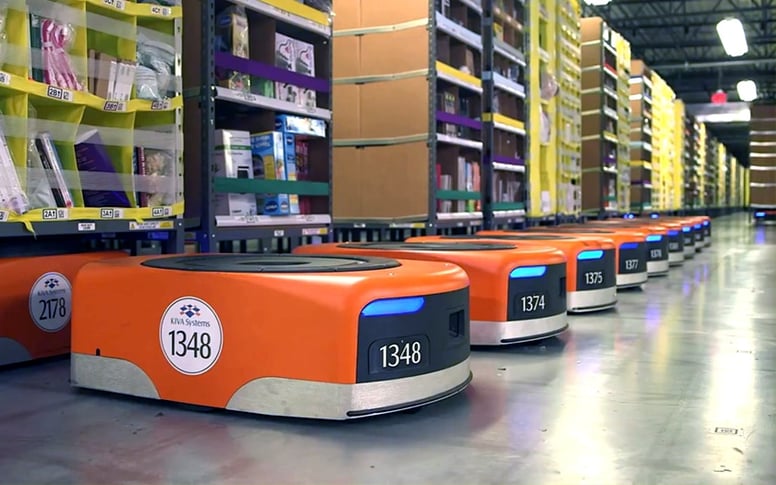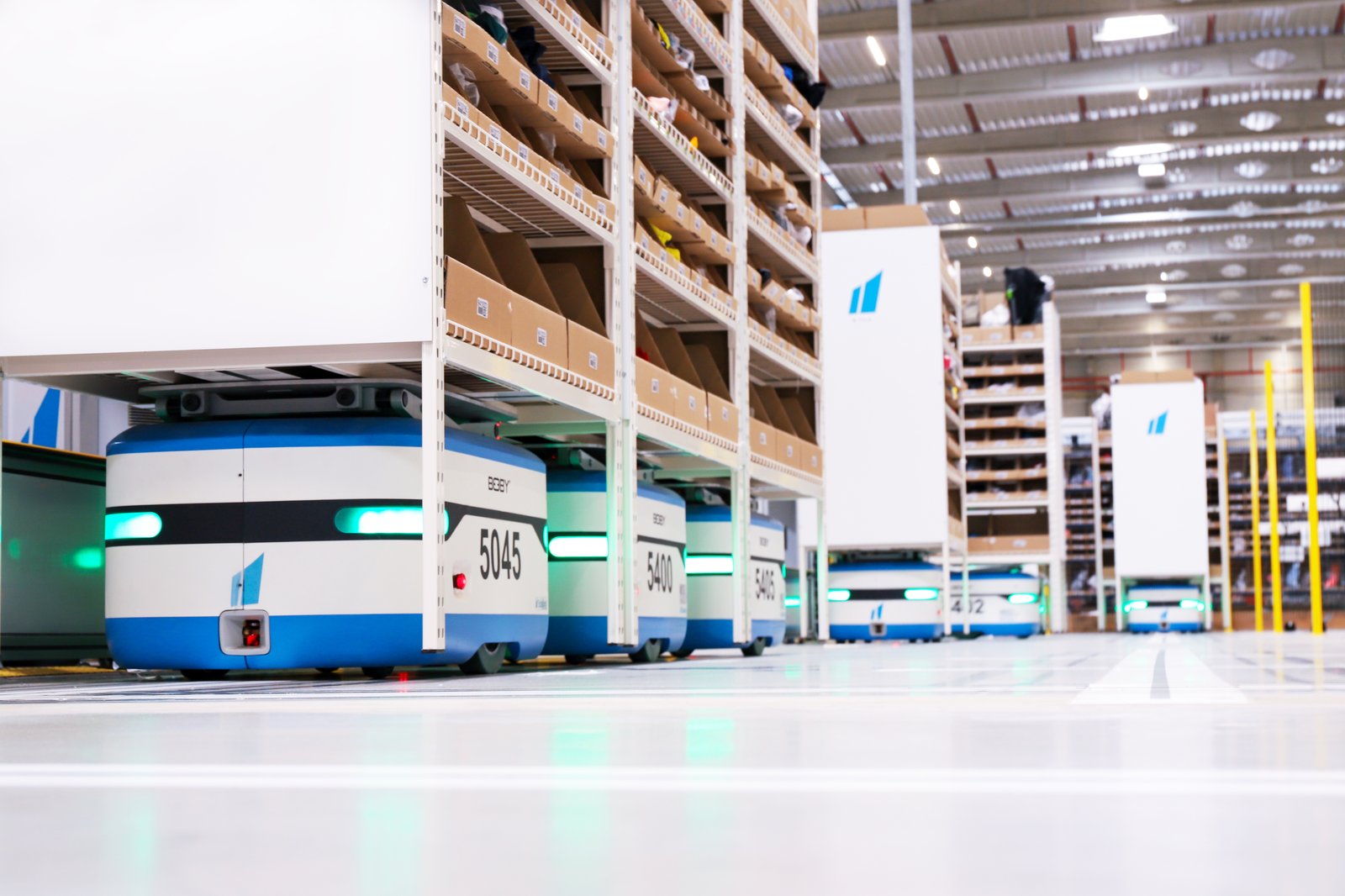Supply chain enterprises looking to increase their productivity and reduce the repetitiveness of operator tasks are investing more and more in the automation of their distribution centres. In 2012, Amazon acquired KIVA Systems, a company specializing in robots for logistics solutions. France had fallen behind in this technology, but Scallog was quick to position itself in an expanding market.
As a French company, Scallog offers a robotic order picking solution that’s particularly suited to the demands of e-commerce, a sector that requires large numbers of small orders to be processed at lower cost.
Although our technology is based on Amazon’s robots, Scallog also offers a business application. Let’s take a closer look at all this.
How did Kiva Systems become Amazon Robotics?
In 2007, Kiva Systems created a sensation with the release of a ideo showing its logistics robots performing a Tchaikovsky ballet.
Kiva Systems was founded by Mick Mountz in 2003. The company filed a series of patents for robots specializing in logistics. Among its clients were Gap, Staples and Saks.

The robots of Kiva / Amazon Robotics © YouTube
In May 2012, Kiva was acquired by Amazon and renamed Amazon Robotics.
Since then, Kiva Systems technology has been usedentirely at the service of the logistics operations of the American e-commerce giant.
Kiva robots are orange and weigh 150 kg each. They can lift loads up to 140 kg and have 8 hours of autonomy.
These are mobile robots which move in a coordinated manner by reading the QR codes in their zone of operation.
Kiva robots are designed to work as part of a goods to man system. The robot slides under a shelf unit, lifts it and carries it to the operator, who only has to pick the items required to fulfil the order.
As a result, operators no longer need to leave their workstations to pick goods from shelves.
Order picking time and operator productivity are optimized.
AAmazon has reduced picking times in its fulfilment centres by half, allowing it to:
- speed up deliveries to customers
- Optimize space by halving storage capacity per square metre (eliminating empty areas and aisles)
According to Amazon, Kiva robots have helped reduce stock retrieval times from 90 minutes to about 15 minutes.
French business daily Les Echos estimates that as early as 2014 Amazon had envisaged saving between 400 and 900 million dollars in annual running costs thanks to this technology.
In the warehouse, the system considerably reduces the distances operators have to travel, and that improves health and safety in the workplace.
Boby: Scallog’s made-in-France robot
Founded in 2013, SCALLOG builds the same type of smart logistics robots as Amazon Robotics. The Scallog robot is called Boby.
Olivier Rochet, founder of Scallog, graduated from a school of engineering and has closely followed the evolution of robotics technology in logistics.
After a thorough analysis of the Kiva Systems robots, he adapted the concept to the constraints typically faced by French logistics hubs.
Scallog's smart robots also use “goods to man” technology to move order picking shelves to operators.
With no need for significant alterations to the original building structure, the warehouse is quick and flexible to lay out.

© Boby robots / SCALLOG
All you have to do is stick guide strips to the floor for the Boby robots to move around the distribution centre. 5 to 6 robots can manage a hundred shelf units, and that means:
- 30% less storage space
- productivity 3 times higher than manual picking
- guaranteed ROI within 2 years
Our goal today is to make smart logistics robots accessible to the whole market. Our new generation of robots is very fast to deploy. Customers can scale up the storage area as needed.
- Olivier Rochet, CEO of Scallog (speaking on RT Flash)
Scallog and Amazon robots - a comparison
In terms of “logistics 4.0”, the two robots look similar. Nevertheless, they are quite different in the softwarethey run.
Amazon Robotics uses the Kiva solution on an exclusively internal basis to meet its own needs.
Kiva includes a concept of robot control, but not necessarily a business software application (where software designates a set of instructions given to a computer device).
Scallog offers a complete automation solution. This solution includes a highly business-oriented Warehouse Control System (WCS) which adapts to different order picking requirements according to the sector (pharmaceuticals, cosmetics, textiles, food etc.).
As Scallog’s CEO Olivier Rochet explains, the business application factor is a significant differentiator relative to with Amazon Robotics:
The business dimension of the Scallog solution optimizes the entire system. That’s where the added value of our solution lies, and that’s the factor that sets us apart in the market.
Originally inspired by Amazon technology, Scallog has established itself in the logistics 4.0 market by offering its customers significant benefits. The enhanced software dimension of Scallog makes it possible to manage a multiplicity of different tasks.
The main advantages of the French solution lie in its optimization of space, productivity and rapid ROI.
With turnkey goods to man functionality, Scallog’s is one of the easiest warehouse automation systems to implement, and at the same time the most agile.
Scallog robots open new perspectives for enterprises by speeding up their order picking times for ever faster deliveries.
Looking to make your warehouse more dynamic and reduce your delivery times? Need to modernize your warehouse without committing to costly modifications to infrastructure?
Get in touch with Scallog: our advisors will be delighted to assess the feasibility of your project.






Laisser nous votre commentaire